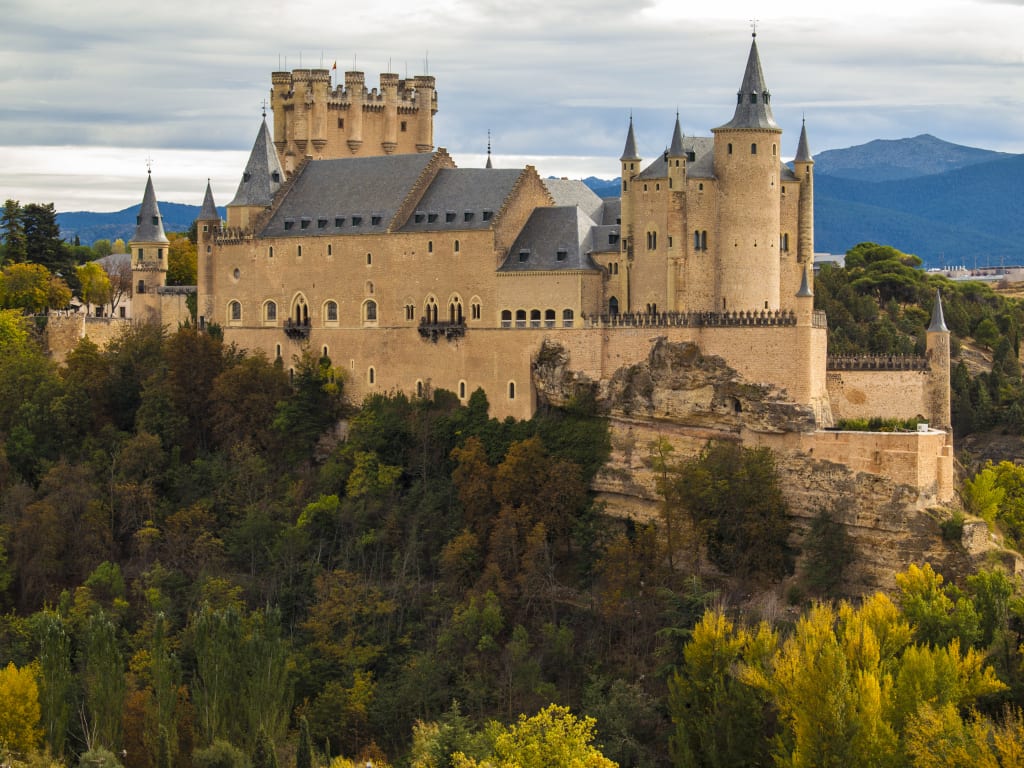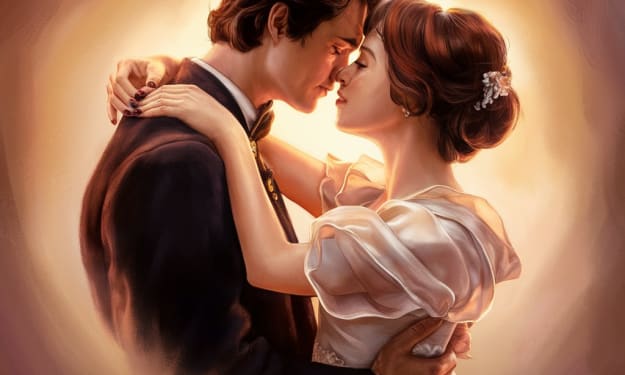An Uncrowned King Chapter 1 Part 2
A Kingdom Going Begging

“It was connected with your own election to the Legislative Assembly, was it not?” asked Usk.
“It was, milord. I had been absent from my country for many years, owing to my having once taken part in a meeting of those who wished to bring about a reform by means of constitutional agitation. I was a young man when I threw in my lot with the reformers, and had just begun to practise at the bar, but I was obliged to leave Thracia, and sacrifice all my prospects. My years of exile were not wasted. I travelled, I worked, I associated with earnest men—and I found my country a byword everywhere. At last I could endure it no longer, and I made up my mind to set on foot one more effort to stir up my compatriots to a sense of their degradation. I returned to Thracia, and found myself received with joy, yet with fear, by my old friends and by the younger generation of patriots that had sprung up. Once more we set ourselves to form a constitutional party, and to educate public opinion. Our objects were simple,—the dismissal of the Scythians who had been thrust into public offices, the reform of the whole corrupt administration, the discontinuance of the system of borrowing, and the gradual repayment of our debt to Scythia out of the money saved by reducing expenses and gained by the proper development of the country. We were quite ignorant of the extent to which our views found favour among the people, but we determined upon a bold stroke—in order both to advertise our programme and to show us how we were supported. The Elections were approaching, and we resolved to contest every seat for which we could find a candidate. The Administration was utterly taken by surprise, but its members perceived that their salvation lay in striking at once, and they chose to begin with me. I was elected by a large majority for the constituency to which I offered myself, but my election was declared void by a Government decree, and a fresh poll was announced. Troops were drafted into the town, nominally to preserve the peace, in reality to force my constituents to vote for the Government candidate, and vast numbers of persons crowded in from the country districts, drawn by the prospect of a tumult. I was passing through the market-place when a band of my supporters called upon me for a speech. Then, milord, I felt a strange fire seize me. I remembered the effect, long before, of my speech to the meeting for taking part in which I was exiled. I remembered that in my days as barrister I had often moved the court to tears and to indignation. It was merely a flash of memory, but with it came the impulse to act. I sought a place from which to speak—I climbed upon a country cart—I spoke—I heard the people shouting—the Government agent ordered the soldiers to arrest me—I saw them pushing their way through the crowd—they closed round me, dragged me down—I appealed to the bystanders—I was rescued—I spoke again, and raised the cry of Reform. Before I knew what had happened I was at the head of a revolution, the people had put themselves under my guidance, the troops had joined us, the Government agent was seeking the means for flight. By my orders he was captured and lodged in prison—I seemed to perceive at once what was to be done. The telegraph-office was seized, no message allowed to be sent but by my authority. To each of our candidates for the Assembly I telegraphed what had happened, and his orders. A brief pause to concert my plans with my chief supporters, and we were in motion again. The news spread through the country like wildfire; in a short time the whole army was with us, and the people were thronging to us in enormous numbers. We marched to Bellaviste, and entered the city without striking a blow. When we laid before the king our demands for a change of Ministry and a new constitution, he preferred to abdicate rather than grant them. We were nothing loath, and he has retired to the south of France on a suitable income. A provisional government was formed, and has remained in power, supported by the whole force of the national sentiment, for nearly a year. The success of our movement was due to its spontaneity. If we had prepared for it, Scythia would have gained some inkling of our plan, and might have out-plotted us, but she could not without any excuse interfere with the accomplished fact. In the very first moment of our freedom we ranged Pannonia on our side by making overtures to her for the conclusion of a commercial treaty which had hitherto been hindered by the intrigues of Scythia. To Scythia we were able to guarantee, through the good offices, secretly exercised, of Pannonia, the regular payment of her interest, and the gradual extinction of the debt itself, while the dismissed officials received honourable terms. It was not easy to arrange all this, for at first we found it difficult to obtain money, and the Thracians are hot-blooded and had much to avenge, but I would not remain at their head except with their promise to acquiesce in my decisions. Balancing Pannonia against Scythia in this way, we have passed through a year of national life, although Scythia refuses to recognise us, and has worked upon our suzerain, Roum, to withhold from us up to the present time the right we claim of choosing our own form of government.”
“Then, if that right were conceded, you would proclaim a republic?”
“Certainly not, milord. I myself might approve of such a step theoretically, but our people are not ripe for it, and not only Scythia, but Pannonia and the other friendly or neutral Powers, would be alienated by the idea. I look around me on the present chaotic state of the country, at the new Thracia which is rising out of the ruins of the old, and I see that it would be impossible for any man popularly elected to introduce the necessary reforms unless he were guaranteed dictatorial powers for a term of years; and for this we cannot hope. In spite of our marvellous success hitherto, we are not perfect, nor even unanimous, and there are many divisions and jealousies among us.”
“It shows great self-abnegation on your part to give up the idea of a republic,” said Usk, “for you yourself would be the only possible President.”
“I fear you rate my moral qualities too highly, milord. The presidency would not be a bed of roses. Even as matters now stand, my life has already been attempted three times, and if I were President, Scythia would never rest until she had—well, brought about my removal, and had plunged Thracia into such a state of anarchy as might seem to justify her in the sight of Europe in interfering to restore order. Besides, I am a Thracian, one of the people, and they need some one who is above them and outside them to rule them at present. This is the reason why we are seeking to re-establish the monarchy on a constitutional basis. This is the reason why I have come to England to offer the crown of Thracia to you, Milord Usk.”
“Come to offer the crown to me!” repeated Usk, stupidly.
“I will not disguise from you, milord,” said M. Drakovics, bringing his head very close to his hearer’s, and speaking low and earnestly, “that we have made many attempts to obtain a king from the different reigning families of Europe. It was at first our great hope that we might secure one of the younger members of the English royal house, but this honour has been absolutely refused to us, and it was the same with several German princely families. We offered the crown to Prince Otto Georg of Schwarzwald-Molzau, the King of Mœsia’s cousin, whose family were willing that he should accept it, but he considered that the kingdom was likely to be too troublesome to be agreeable. We had even thought of a French prince, but there is the religious difficulty——”
“But I do not belong to the Greek Church, and I have no intention of joining it,” interrupted Usk.
“We could accept a Protestant, milord, but a Roman Catholic would be impossible.”
“But I am not even remotely connected with royalty,” objected Usk again.
“It is the boast of you English nobles that you are on a level with any of the princely houses of the Continent that are not absolutely royal,” said M. Drakovics, “and you are far richer.”
“Not our family, at any rate,” said Usk, with a shrug. “But I have had no experience in governing. Why don’t you ask some one who has been Viceroy of India or Lord Lieutenant of Ireland?”
“Because they are old, milord, and you are young: our young nation needs a young man at its head. But you are not a novice in the affairs of State. Who is so fit to introduce constitutional principles into Thracia as a member of the British House of Commons—one, moreover, who has shown himself friendly to any reasonable reform judiciously and fairly carried out? Nor would you find the actual work of governing a very difficult matter. I, who have been said to be the Revolution, am now the Government. I make the laws, and then commend them to the people, and this would continue to be the case as long as I was so happy as to retain your confidence, while you acted as the visible head of the Government and the sign of the unity of the nation.”
“As the figurehead, in fact?” said Usk.
“Precisely, milord.”
“But you ought to have a soldier, and I am not one.”
“You are an officer of Volunteer cavalry, and that is sufficient.”
“You seem to know a good deal about me.”
“It is natural to study deeply the history of one’s future king, milord, and you appear to be better fitted for the high post I offer you than any of the other noblemen to whom my thoughts have turned.”
“But this is absurd!” cried Usk. “You must know that I should not be allowed to entertain such an idea for a moment. Our Government would put a stop to it instantly. It would be high treason, treaty-breaking—I don’t know what.”
“The matter is a secret, milord. Once in Thracia, and crowned, your Government could scarcely bring you back.”
“Do you expect me to give up my own country—make myself an outlaw, in fact—for the sake of your precious Thracia?”
“Yes, milord,” said M. Drakovics, steadily, “that is what I do expect. You are the very man for us—by reason of your personal advantages especially. Our people worship tall fair men, for they recall to them the heroes of their legends. Then you are descended from a great house of warriors. Milord your father fought in the Crimea, your grandfather at Waterloo, and your great-uncle was killed fighting in the cause of Greek Independence. Again, you are unmarried, but yet you do not share the tastes of our late lamented sovereign, King Peter Franza, and you would thus be able to consolidate your dynasty and strengthen your kingdom by an advantageous matrimonial alliance.”
“That is not the way in which English people are accustomed to look at marriage,” said Usk, coldly.
“It is the way in which a patriotic king looks at the subject, milord. I am making no effort to disguise from you the drawbacks of the great position I offer you. We do not want a pleasure-seeker, but one who will be a martyr, if need be. We require a man who will give up his country, his friends, his own happiness—who will be ready either to live or to die for this Thracia of ours, which we have saved from Scythia and the Franzas.”
M. Drakovics saw that his words had at last produced something of the effect he desired. Usk’s head was lifted proudly, and the light of battle shone in his eyes, but his response was disappointing.
“I will consider the question,” he said.
“Give me your promise, milord. Why should you hesitate? You are not thinking of palaces and the probable length of your Civil List, I know, so why not let me feel happy in the certainty that my country’s future is assured?”
“I must consult my father. He has a right to be told.”
“Come back to Thracia with me, and be crowned, and then tell him. He will be glad to be spared the trouble of advising you.”
“No, it would not be fair to him. I will let you know some time to-morrow. Good night,” and he left the room before M. Drakovics could stop him or even say anything further. His impulse was to get out of the house at once, and cool his heated brain by walking back to his lodgings, but he did not like to leave without bidding farewell to Mrs Sadleir. Entering the drawing-room in search of her, he was accosted by a man whom he knew slightly as connected in some way with the ‘Daily Chronograph.’
“Nasty sell for you, wasn’t it?” he remarked. Usk stared at him blankly.
“I don’t know what you mean,” he said.
“Why, this afternoon—about that Bill of yours. Have you forgotten it already?”
“Oh—my Bill,” repeated Usk, vaguely. “I have been thinking of—of other things since then. Excuse me, I can’t stay.”
“He looks perfectly dazed,” said the other man to himself. “What can it be? Has some girl chucked him? No! who’s that talking to Mrs Sadleir? Drakovics, no less!”
He made his way towards his hostess, arriving just in time to hear her farewell to Usk.
“Perhaps you will have something to tell me to-morrow, Usk. If so, look in about three o’clock. I shall be quite alone.”
“Nuts!” muttered the journalist. Then aloud to Mrs Sadleir he added, “Surely I saw our old friend Drakovics here just now?”
“Yes, he is here to-night,” said the hostess. “We don’t make a fuss about our foreign guests nowadays, and have receptions at Trentham House and public festivities for them, you see. They come and go quietly.”
“Still looking for a king, eh? He has come to England to try and get hold of the latest royal infant as a ruler for his one-horse State, hasn’t he?”
Clever woman though she was, Mrs Sadleir could occasionally be “drawn,” and this the ‘Chronograph’ man knew well. She smiled now significantly as she answered—
“No, I really don’t think he has designs on the Princess’s baby this time. What, must you go?”
Indeed he must, post-haste to the ‘Chronograph’ office, bearing news which set editor, foreign editor, sub-editor, and printer frantically to work altering and cutting and curtailing the copy already set up in such a way as to provide room for a column with startling headlines:—
“THE BALKAN QUESTION.
RECONSTRUCTION OF THE THRACIAN MONARCHY.
ROMANTIC CHOICE OF A KING.
CROWN OFFERED TO AN ENGLISH NOBLEMAN.
INTERVIEW WITH VISCOUNT USK, M.P.”





Comments
There are no comments for this story
Be the first to respond and start the conversation.